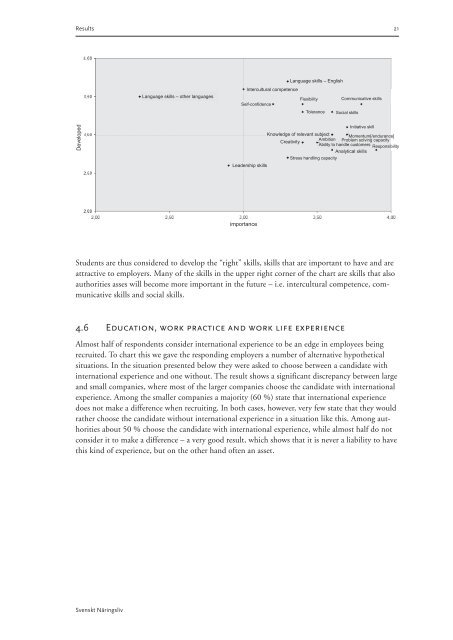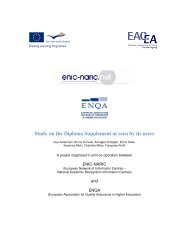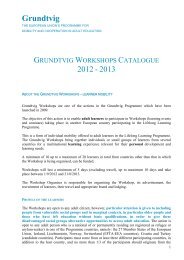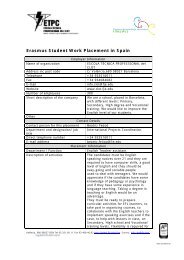Employers' view on studies abroad - Svenskt Näringsliv
Employers' view on studies abroad - Svenskt Näringsliv
Employers' view on studies abroad - Svenskt Näringsliv
You also want an ePaper? Increase the reach of your titles
YUMPU automatically turns print PDFs into web optimized ePapers that Google loves.
Results 21<br />
Language skills – other languages<br />
Language skills – English<br />
Intercultural competence<br />
Flexibility<br />
Communicative skills<br />
Self-c<strong>on</strong>fidence<br />
Tolerance Social skills<br />
Developed<br />
Initiative skill<br />
Knowledge of relevant subject Momentum[/endurance]<br />
Ambiti<strong>on</strong><br />
Creativity<br />
Problem solving capacity<br />
Ability to handle customers Resp<strong>on</strong>sibility<br />
Analytical skills<br />
Stress handling capacity<br />
Leadership skills<br />
importance<br />
Students are thus c<strong>on</strong>sidered to develop the “right” skills, skills that are important to have and are<br />
attractive to employers. Many of the skills in the upper right corner of the chart are skills that also<br />
authorities asses will become more important in the future – i.e. intercultural competence, communicative<br />
skills and social skills.<br />
4.6 Educati<strong>on</strong>, work practice and work life experience<br />
Almost half of resp<strong>on</strong>dents c<strong>on</strong>sider internati<strong>on</strong>al experience to be an edge in employees being<br />
recruited. To chart this we gave the resp<strong>on</strong>ding employers a number of alternative hypothetical<br />
situati<strong>on</strong>s. In the situati<strong>on</strong> presented below they were asked to choose between a candidate with<br />
internati<strong>on</strong>al experience and <strong>on</strong>e without. The result shows a significant discrepancy between large<br />
and small companies, where most of the larger companies choose the candidate with internati<strong>on</strong>al<br />
experience. Am<strong>on</strong>g the smaller companies a majority (60 %) state that internati<strong>on</strong>al experience<br />
does not make a difference when recruiting. In both cases, however, very few state that they would<br />
rather choose the candidate without internati<strong>on</strong>al experience in a situati<strong>on</strong> like this. Am<strong>on</strong>g authorities<br />
about 50 % choose the candidate with internati<strong>on</strong>al experience, while almost half do not<br />
c<strong>on</strong>sider it to make a difference – a very good result, which shows that it is never a liability to have<br />
this kind of experience, but <strong>on</strong> the other hand often an asset.<br />
<strong>Svenskt</strong> Näringsliv
















